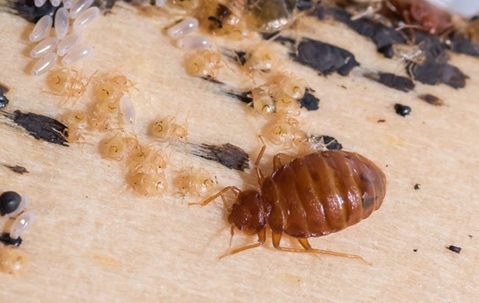Bed Bug Exterminator Houston Services: Professional and Effective Treatments
Bed Bug Exterminator Houston Services: Professional and Effective Treatments
Blog Article
Advanced Bug Control Techniques for a Pest-Free Living Space
While traditional bug control methods have their location, the advancement of innovative methods uses a glimpse into a future where pest-free areas are not simply a desire but a reality. From Integrated Insect Monitoring approaches to cutting-edge High-Tech Bug Checking Systems, a brand-new era of insect control is emerging.
Integrated Bug Management (IPM)
Integrated Pest Monitoring (IPM) is a methodical method that focuses on making use of different methods to manage bugs successfully while lessening environmental effect and economic costs. This method integrates numerous insect control techniques such as organic control, environment control, alteration of social techniques, and the use of resistant crop varieties. By combining these approaches, IPM aims to take care of bugs in a sustainable and ecologically liable fashion.
One secret facet of IPM is the emphasis on avoidance as the initial line of defense against insects. This entails tracking bug populations, identifying possible threats, and implementing positive measures to lower parasite problems before they become problematic. By employing preventative measures, IPM can substantially minimize the demand for chemical pesticides, thereby reducing possible harm to non-target microorganisms and the bordering ecological community.
In addition, IPM advertises using pesticides only as a last resort and in a targeted manner. This targeted approach decreases pesticide use, lowers the threat of chemical resistance in pest populations, and assists preserve a much healthier environment for both humans and wildlife. Overall, Integrated Parasite Administration stands as a detailed and lasting remedy for efficient bug control while prioritizing ecological preservation and economic effectiveness.
All-natural Repellents and Deterrents
Making use of all-natural repellents and deterrents is a lasting and environmentally friendly approach to taking care of pest populaces in different atmospheres. Natural repellents function by leveraging fragrances or substances that pests locate undesirable or overwhelming, driving them far from the area. For example, pepper mint oil is reliable in deterring spiders, while citrus peels can repel ants. Growing marigolds around a garden can help maintain away insects like aphids and insects as a result of their strong aroma - bed bug exterminator houston near me. Furthermore, essential oils such as lavender, eucalyptus, or tea tree oil can act as all-natural insect repellents when weakened and splashed around your home.
Physical deterrents also play a considerable duty in insect control. By including natural repellents and physical deterrents right into insect administration strategies, individuals can develop a pest-free living room while lessening the ecological influence.
Targeted Insect Exemption Strategies
When implementing reliable bug control techniques, targeted insect exemption methods are important for preventing details parasites from accessing or infesting an assigned location. These methods entail determining the susceptabilities that pests might make use of to obtain entry and implementing procedures to block their gain access to points (bed bug exterminator houston near me). By concentrating on targeted parasite exemption strategies, house owners can develop a robust defense against undesirable intruders, promoting a pest-free living area.
Biological Control Techniques

One typical organic control technique is the introduction of killer pests like ladybugs or parasitical wasps that prey on details pests, keeping their populaces in check. These predators act as a natural kind of parasite control without the need for chemical interventions. Additionally, microbial insecticides derived from normally occurring microorganisms, fungis, or viruses can infect and kill parasites while presenting minimal risk to people and beneficial bugs.
Applying biological control approaches calls for a complete understanding of the ecological community and the bugs existing to present one of the most effective all-natural opponents. By incorporating organic control right into pest management techniques, homeowners can attain a pest-free home while promoting ecological balance and decreasing dependence on chemical pesticides.
High-Tech Bug Keeping Track Of Equipments
Advanced electronic devices play a pivotal function in contemporary bug control by giving exact and real-time information with sophisticated parasite find out this here monitoring systems. These systems make use of sophisticated technology to identify and track bug activity, enabling very early treatment and targeted therapies. Sophisticated pest tracking systems commonly are composed of sensors, electronic cameras, and automated information analysis tools that use unequaled insights into bug actions and patterns.

Furthermore, sophisticated pest tracking systems are internet designed to be user-friendly, with user-friendly user interfaces that help with simple interpretation of information. By leveraging these ingenious devices, insect control experts can carry out much more efficient and sustainable techniques, eventually developing pest-free environments for property and industrial areas alike.
Conclusion
To conclude, implementing sophisticated insect control techniques such as Integrated Pest Management, natural repellents and deterrents, targeted parasite exemption strategies, biological control methods, and modern pest tracking systems can successfully develop a pest-free living space. By using a combination of these techniques, people can stop and take care of insect invasions in a sustainable and eco pleasant manner. It is critical Web Site to prioritize bug control actions to make sure a healthy and balanced and comfy living environment.
Report this page